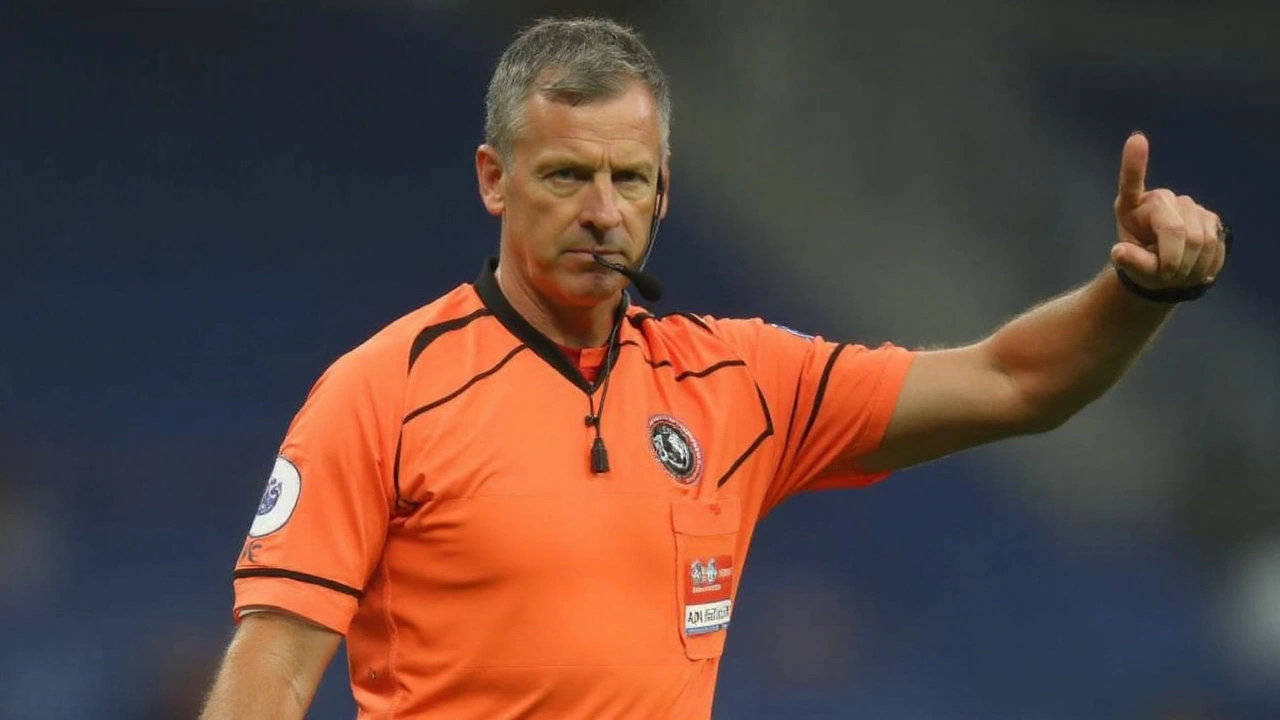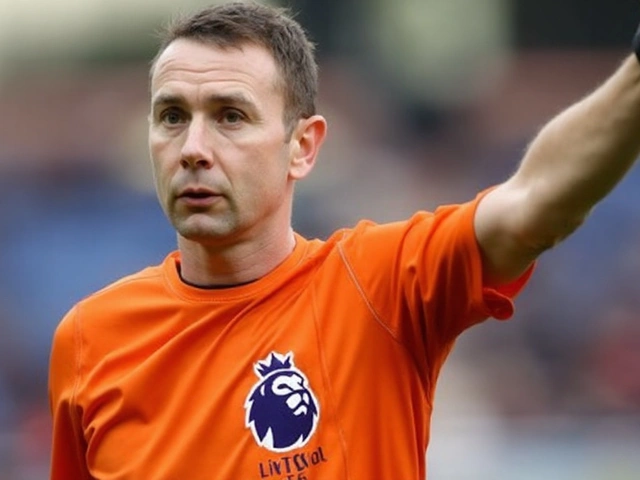Court appearance and the charge
David Coote, the former Premier League referee, has pleaded not guilty to a Category A child image charge at Nottingham Magistrates’ Court. The 43-year-old from Collingham, near Newark in Nottinghamshire, spoke briefly to confirm his name and date of birth before entering his plea in an 18-minute hearing. The case was sent to Crown Court after Coote elected a jury trial, with a pre-trial hearing listed for October 9 at Nottingham Crown Court.
District Judge Gillian Young granted conditional bail. The restrictions bar him from unsupervised contact with anyone under 18 and from living in a household with a minor unless approved. These are standard conditions in cases involving alleged indecent images, aimed at managing risk while the court process plays out.
Prosecutor Ben Payne told the court the charge stems from a single video file recovered by Nottinghamshire Police in February 2025. The file was said to involve a 15-year-old. According to Payne, the material surfaced after an investigation by the Football Association, during which mobile devices were examined by a third party. Police later arrested Coote at his home and seized two laptops. He was formally charged on August 12.
Coote denies the allegation. Payne indicated the starting point for sentencing in a case of this type would be around a year in custody, though any sentence would depend on what a jury finds and the specifics of the material. By opting for Crown Court, Coote secured a jury trial, which is common in serious cases contested by the defendant.
To be clear, “making” an indecent image under English law does not require creating the original footage. The legal definition often covers downloading, saving, or otherwise causing a copy to exist on a device. Category A is the highest level in the UK’s classification of indecent images of children, reserved for the most serious content. Coote has not been convicted and is presumed innocent unless and until a jury decides otherwise.
Defense solicitor Fraser Williamson asked the court to restrict publication of Coote’s home address, arguing safety concerns tied to threats made toward the referee during his career. The judge refused the application, and standard reporting rules remain in place. That decision reflects how open justice normally works in England and Wales, where anonymity is rare unless a credible, exceptional risk is shown.

How a top-flight refereeing career unraveled
The criminal charge lands on top of a turbulent year for Coote, who once held a prominent spot among elite English referees and worked as a VAR official at major tournaments. In December 2024, he was sacked by Professional Game Match Officials Limited (PGMOL) after a video circulated online of him making abusive, derogatory remarks about then-Liverpool manager Jürgen Klopp in 2020. The clip’s spread on social media prompted swift action from the refereeing body.
UEFA then stepped in with its own sanction. Following a separate video that appeared to show Coote snorting white powder through a banknote while in Germany for Euro 2024, where he served as an assistant VAR, European football’s governing body banned him until June 30, 2026. UEFA appointed an ethics investigator to review the incident, underscoring how seriously the organization treats conduct by match officials, even outside the field of play.
In August 2025, the Football Association issued an eight-week suspension tied to the Klopp footage. By that point, multiple videos had surfaced showing a pattern of unprofessional behavior. For a referee whose job depends on trust, neutrality, and composure, the public leaks were devastating.
Coote tried to explain the personal turmoil behind the headlines in January 2025, when he came out as gay in an interview with The Sun. He said years of hiding his sexuality contributed to the outburst about Klopp and to the episode involving apparent drug use. That disclosure led to a wider conversation in the game about the pressure on officials and the limited support structures they sometimes have. Still, his remarks were an explanation, not a legal defense, and the disciplinary process carried on.
Before his downfall, Coote’s CV was solid. He climbed through the Football League, reached the Select Group of Premier League referees, and took charge of high-profile matches in England’s top flight. He also had repeated stints in the video operations room, where VAR scrutiny demands total focus and clear judgment under intense time pressure. The job is thankless at the best of times: every decision is analyzed frame by frame by fans, pundits, and clubs.
The courtroom disclosures on Thursday pulled the story far beyond sporting discipline. Payne told the magistrates that a third-party examination of devices as part of a Football Association inquiry led to police involvement. While it was not detailed in open court, such examinations commonly involve chain-of-custody protocols and specialist forensic tools to preserve evidence and metadata. Those procedures can become focal points at trial if the defense challenges how data was handled.
Here is the timeline as set out in court and public statements so far:
- December 2024: PGMOL dismisses Coote after a 2020 video of abusive remarks about Jürgen Klopp spreads online.
- June–July 2024: While in Germany for Euro 2024 as an assistant VAR, a separate clip emerges that appears to show drug use; UEFA later bans him until June 30, 2026, and opens an ethics review.
- January 2025: Coote comes out as gay in a newspaper interview, discussing pressure and secrecy around his private life.
- February 2025: Nottinghamshire Police recover a video file during an investigation, prosecutors say.
- August 12, 2025: Coote is charged with making an indecent image of a child; the image is classified as Category A.
- August 2025: The FA issues an eight-week suspension related to the Klopp footage.
- September 2025: Coote pleads not guilty at Nottingham Magistrates’ Court; the case is sent to Crown Court with a pre-trial hearing set for October 9.
Because the alleged image is classed at the highest category, the case carries weighty sentencing possibilities if a jury convicts. In general, UK sentencing guidelines for Category A images include custody ranges that escalate with the number of files, the role played by the defendant, and any aggravating factors. The figure cited in court—a year in custody as a starting point—offers a rough marker rather than a fixed outcome.
What happens next? The October 9 Crown Court hearing is a case management step. Judges typically deal with plea and trial preparation, legal arguments over admissibility of evidence, and timetabling for a full trial. If there are disputes about how the devices were searched, who handled the data, or the interpretation of file timestamps, those may be thrashed out ahead of, or during, the trial itself.
For now, the bail conditions limit his day-to-day life but allow him to remain in the community. Breaching such conditions can prompt arrest and a bail review, sometimes resulting in tighter rules or remand. The court did not impose electronic monitoring or a curfew at this stage, based on what was said in open court.
Coote’s failed bid to keep his address out of the public domain speaks to a larger issue: the hostility referees face. Football authorities have documented long-running problems with online threats and abuse aimed at officials. While the judge acknowledged the concern, the legal threshold to restrict reporting is high. Courts weigh the safety risk against the principle of open justice, and in this instance transparency won out.
Beyond the legal process, the case puts a spotlight on how football regulates its own. PGMOL oversees referees in the professional game and expects strict standards of conduct, on and off the pitch. The FA handles disciplinary matters within the English game, and UEFA governs at the European level. When allegations cross into criminal territory, the sport’s disciplinary track and the criminal courts run in parallel, each with its own standards of proof and sanctions.
There’s also the human element. Coote’s rise showed the pathway for ambitious referees from county leagues to the Premier League, powered by assessments, fitness tests, and years of steady performance. His fall shows how quickly credibility can unravel in the age of smartphones, viral clips, and relentless scrutiny. For officials, reputation is currency. Once it’s spent, there rarely is a route back.
Still, the charge now before the courts is separate from the past videos that wrecked his career. The jury will be asked to make a narrow decision based on evidence about a specific file, not to pass judgment on his public embarrassments. That line can be hard to hold once a case enters the public arena, but it’s the core of the criminal justice system.
As things stand, Coote remains on conditional bail and maintains his not guilty plea. Prosecutors will set out their case in full at Crown Court. The defense will have its say. Until then, the only firm dates are on the court list, and the only certainty is that one of English football’s most dramatic officiating falls has now moved from the back pages to the dock.
